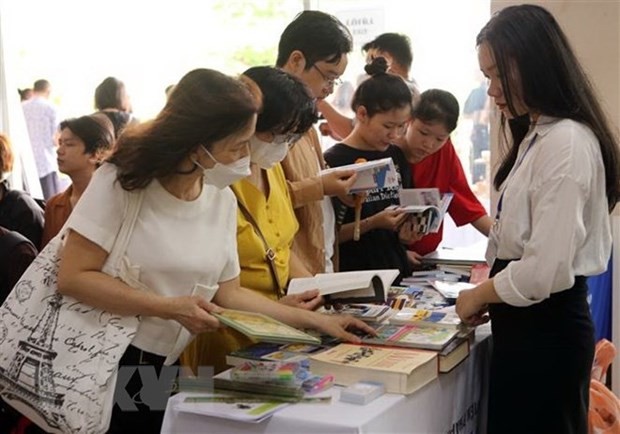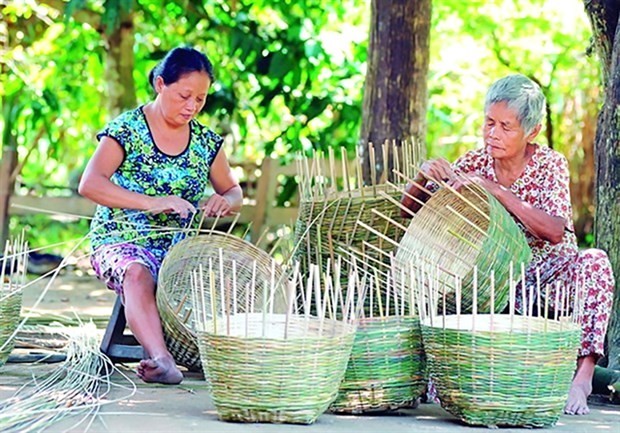
Toward sustainability of community-based tourism in Hanoi
Latest
The capital city is home to 18 outlying district-level localities with typical rural areas and a rich persist of historical relic sites, intangible cultural heritage, and cuisine.
Over the recent years, the city’s agriculture sector and localities have paid attention to tapping into local natural resources, heritage, craft villages, culture, and agricultural advantages in the suburbs to develop tourism. Initial but encouraging results have been recorded.
Turning culture, and agricultural products into tourism resources
Many local communities have actively engaged in tourism activities such as the Bat Trang pottery village (Gia Lam district), the ancient village of Duong Lam (Son Tay town), the Huong Son relic site (Huong Pagoda in My Duc district), the ornamental plant village of Hong Van (Thuong Tin district), and the Ha Mo tourist site (Dan Phuong district).
Community-based tourism has helped create jobs, improve local residents’ life quality, bring into play cultural and historical heritage values, and promote products of craft villages and agriculture.
 |
| Visitors to a showroom of ceramic products in the Bat Trang pottery village in Gia Lam district, Hanoi. (Photo: VNA) |
Phu Xuyen district, known as the land of a hundred crafts in the south of Hanoi, has had 43 craft villages recognized by the city’s authorities. It is also home to 112 ranked historical relic sites, including 35 at the national level and 77 at the municipal level, along with specialized farming zones favorable for experience tourism.
Two local tourist sites have also been recognized by municipal authorities, namely the mother-of-pearl inlaying and lacquer products village of Chuyen My and the tailoring village of Van Tu. Phu Xuyen looks to become a key district in craft village tourism of Hanoi in the 2025 - 2030 period.
Meanwhile, the ancient village in Duong Lam commune of Son Tay town is currently a tourist magnet in the capital city. More and more local residents have joined the tourism service supply chain with such activities as offering tours of ancient houses, culinary services, homestay services, renting out bicycles, and selling souvenirs. As a result, Son Tay town welcomed 654,000 tourist arrivals in 2022, including 340,000 to the village in Duong Lam commune.
Communities join hands in tourism development
 |
| At the jewellery craft village of Dinh Cong in Hanoi. (Photo: VNA) |
To sustainably develop community-based tourism, it is necessary to improve local residents’ awareness and skills since they are the key stakeholders in this type of tourism.
Given this, the Hanoi Tourism Department has coordinated with localities to help communities engage in the tourism chain.
From mid-May to early June, it worked with district-level authorities to provide training in civilised behaviours and community-based tourism to residents in Ha Mo commune (Dan Phuong district), Phu Yen commune (Phu Xuyen district), and Duong Lam commune (Son Tay town).
Phan Cong Tinh, head of the culture and information passion of Dan Phuong district, said that in the coming time, the district will partner with the municipal Tourism Department to develop model sites of agricultural, rural, and community-based tourism, with a focus on local craft villages and cuisine. It will also join hands with travel companies to build an entertainment tourism model in the area of the Red River alluvial ground.
Therefore, it is critically important to equip locals with tourism skills, he noted.
Assoc. Prof. Pham Hong Long, Dean of the Faculty of Tourism Studies at the VNU University of Social Sciences and Humanities Hanoi, said it is necessary to provide training and guidance for locals while giving them chances to practice in reality.
He held that the Tourism Department’s coordination with outlying districts to develop community-based and green tourism will help not only fuel this sector but also personify livelihoods in rural areas, uphold traditional cultural values, and improve people’s material and spiritual lives.
The department said it will continue opening training courses for local communities so as to improve tourism service quality and attract more domestic and international visitors.
In the first five months of 2023, Hanoi attracted more than 10.1 million visitors, up 53.9 per cent year on year. That included over 1.7 million international arrivals, surging almost 10-fold, statistics show.

















